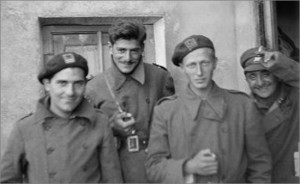Aaron Lopoff by A. C. B. [Alvah Bessie]

Lincoln-Washington Officers, Aaron Lopoff, Milton Wolff, George Watt, Joseph Brandt, Darmos, May 1938. The 15th International Brigade Photographic Unit Photograph Collection; ALBA Photo 11; ALBA Photo number 11-0423 (E0596). Tamiment Library/Robert F. Wagner Labor Archives. Elmer Holmes Bobst Library, 70 Washington Square South, New York, NY 10012, New York University Libraries.
The Volunteer for Liberty, V. 2, No. 33, October 6, 1938.
During the days when we used to joke about withdrawal of the volunteers and wonder when the car was coming down the road with the tellers from then Non-Intervention Committee. Aaron used to say “I hope they don’t get here before we have another action, before they send us home.” He was not joking; un-expressed was his desire to lead his company –better still, to test himself in the post of responsibility that had been entrusted to him. This sense of responsibility could be felt by those who were close [to] him in those days, and in the days that followed when we crossed the Ebro and entered the action that cost him his life. You knew he felt this responsibility and that it would be a matter of pride with him to live up to it. You would not need have written— “Talk to cabos and sargentos;” “Coordinate work of sections”—you would have found these words, under the heading “Personal;” “What about myself? How can my own work be improved?”
He would not have agreed that his work could not have been improved; he would never have admitted that the Command of the Lincoln considered him one of its most experienced and responsible leaders; he would have given you an embarrassed look and most likely walked away. For his modesty, as a mand and a company commander, was as genuine as the necessity he felt to prove himself in still more action. “When you have a lot of other guys to worry about,” he used to say “you can’t be afraid for yourself.” And he was worried about those other guys; he was worried about them to a considerable extent – this too was a measure of the man’s anti-fascist understanding. He wanted to spare his comrades as much as they could possibly be spared.
But he did not spare himself; he gave himself. At Hill 481 he led his men into the attack; at 666 he was in the trenches with them, snatching up a rifle with boyish exuberance, saying “I haven’t had [a] chance to fire a rifle in a dog’s age. Later that night he led his company in the attack, falling in front of the enemy’s barbed wire. As he was being carried out he said “Did they take the hill? Is the company all right?” We told him that they took the hill; that the company was doing fine and he said, “That’s good.”
The record is clean and consistent. He left home when he was in his early teens and hoboed all around the States. He used to describe those days with gusto, saying “Those were the happiest days of my life.” He worked his way part way through college and, for a time, played with the idea of being an aeronautical engineer. “Then I sort of got bored,” he would say. He made a living by writing fiction stories for the magazines. In Spain he joined the Brigade at Fuentes de Ebro and was in every action from that time until his death. At Batea the dark days of April, he was Adjutant to Blackie Mahpralian, taking command of Batea that “… a man dashed up on a big white horse—it was a white horse—and said “Congratulations Loppy, you’re a Teniente now.” For a few days while the Battalion was reassembled and Captain Wolf’s whereabouts were still unknown, he was Commander of the Lincoln. In May, when our new Spanish recruits came up, he was placed in command of Company 2. At Sierra de Pandols he met his death.
The death of one man merits little commentary when thousands of men, women, and children are dying daily under circumstances which do not even permit them the opportunity to fight for their lives, as Aaron fought for his. And in a sense his death is a part of their deaths, just as his life was a part of theirs. But if it were possible for a man to survive his death and overhear others speak of him, we know what Aaron would have said if he had heard us say. “Too bad Lopoff’s gone.” He would have said “Do you want my shoulder to weep on?” For it was part of his youthful emotion under mask of indifference. But the mask rarely fit him, and he would drop it at moments; such moments for example as when he spoke of Blackie Mahpralian












